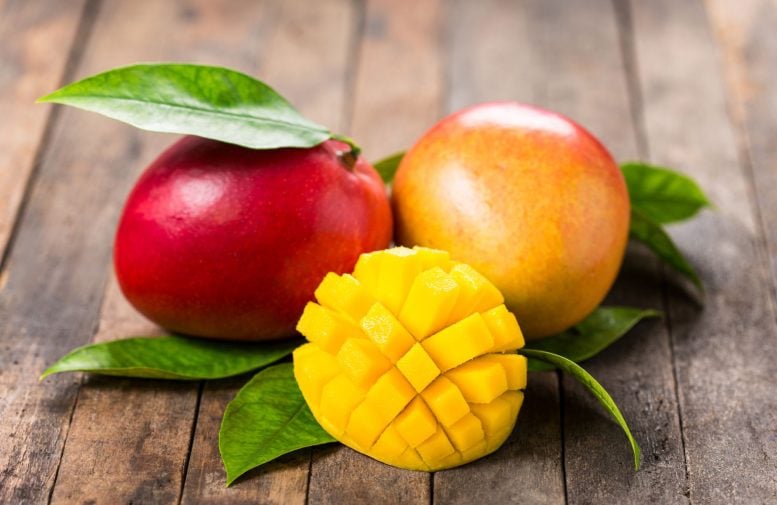
Women of childbearing age (WCA) who incorporate mangoes into their diets experience a significant improvement in diet quality and nutrient intake, according to a study analyzing data from the National Health and Nutrition Examination Survey ( NHANES). The study found that mangoes increase the intake of key nutrients needed for a healthy pregnancy, such as fiber, folate and vitamins, while reducing the consumption of unwanted nutrients such as added sugars and saturated fat.
The new NHANES study shows that diets containing mangoes are linked to improved nutrition and a higher score on the Healthy Eating Index, beneficial for healthy pregnancies.
Women who are trying to conceive, who are pregnant, or who are breastfeeding have unique nutritional requirements that are often not met by current diets. A recent study published in the journal nutrients reveals an important finding: incorporating mangoes into the diet of women of childbearing age (WCA) significantly improves both the overall quality of their diet and their intake of essential nutrients vital for a healthy pregnancy. These nutrients, often underconsumed by 10-30% in pregnant women’s diets, see a significant increase in intake when mangoes are consumed.
“Pregnant women are at risk for several health conditions, including gestational diabetes and hypertension, which put their health and that of their unborn baby at risk,” says study co-author Kristin Fulgoni. “Diet is a key component of prevention plans, and mangoes are a healthy fruit that provide many of the nutrients associated with reducing the risk of pregnancy-related diseases, such as fiber, folate, magnesium, potassium and vitamin E.” .
Researchers collected information from 16,744 women ages 15 to 44 who participated in the National Health and Nutrition Examination Survey (NHANES) between 1988-1994 and 1999-2018. The research used the Healthy Eating Index (HEI), a validated measure of diet quality to assess how well participants followed the 2020 Dietary Guidelines for Americans (DGA) recommendations .
Compared to diets without mangoes, HEI scores were 16% higher among WCAs who included mangoes in their diet.
The higher diet quality is attributed, in part, to differences in nutrient intake between the groups. When WCAs incorporate mangoes into their diets, they have a significantly higher intake of beneficial nutrients and a lower intake of undesirable ones. Notable differences include:
Nutrients to Encourage
- 70% more vitamin C
- 31% more fiber
- 30% more vitamin E
- 26% higher folate
- 16% more magnesium
- 11% more potassium
Nutrients to Avoid
- 17% less added sugars
- 11% less saturated fat
- 9% less total fat
The study also included a second arm of older Americans, age 60 and older, another population that required special nutritional attention. Results among mango eaters versus non-mango eaters show a 13% higher HEI score; higher intake of fiber and vitamin C; and reduces intake of cholesterol, niacin, phosphorus, protein, riboflavin, saturated fat and vitamin B12. The researchers determined that the highest mango consumers had a higher percentage of individuals who identified as vegetarian/vegan, which could explain these lower nutrient intakes, as many of these nutrients are normally found in in higher amounts in animal products.
“These findings add to a growing body of research showing the positive impacts of adding mangoes to various diets,” says Leonardo Ortega, PhD, director of research, National Mango Board. “As a heritage-based food culturally connected to more than 1 in 4 Americans, mango can be an important bridge to improving nutritional equity and the diet and nutrition quality of our multicultural country.”
Study design, strengths and limitations
Food and nutrient intakes were determined from two 24-hour dietary recalls using dietary components from the NHANES and What We Eat in America surveys. The first recall was done in person, and most participants completed the second over the phone. Mango consumers were defined as anyone eating any amount of raw mango as reported at the first or second recall. Nutrient intakes were obtained from both interviews, and usual intake was determined using the National Cancer Institute method. Diet quality was measured using HEI-2020, which gives a maximum score of 100 based on 13 subcomponents, each reflecting a food group or nutrient highlighted in the 2020 DGA.
Strengths of the study included the use of multiple cycles of NHANES data resulting in a larger sample size of mango consumers. Additionally, limitations exist, including the observational nature of the NHANES analysis, which prevents assessments of causal relationships; reliance on dietary memories; and the relatively small percentage of the US population that consumes mangoes.
Reference: “Mango consumption was associated with higher nutrient intake and diet quality in women of childbearing age and older adults” by Kristin Fulgoni and Victor L. Fulgoni, 18 Jan 2024, nutrients.
DOI: 10.3390/nu16020303
The research was funded by the National Mango Board.
#Scientists #discover #health #benefits #mangoes
Image Source : scitechdaily.com